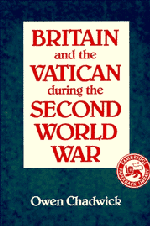Book contents
- Frontmatter
- Contents
- Acknowledgements
- Abbreviations
- 1 Britain and the Vatican in the last years of Pope Pius XI (1935–39)
- 2 The Conclave of 1939
- 3 The peace plans of Pius XII
- 4 The winter war, 1939–40
- 5 The Italian entry into the war
- 6 First months in the Vatican
- 7 Surveillance I
- 8 Surveillance II: the bag
- 9 The Jews in 1942
- 10 The bombing of Rome
- 11 The Italian Armistice
- 12 The German Occupation
- 13 Aftermath
- Select bibliography
- Index
- Frontmatter
- Contents
- Acknowledgements
- Abbreviations
- 1 Britain and the Vatican in the last years of Pope Pius XI (1935–39)
- 2 The Conclave of 1939
- 3 The peace plans of Pius XII
- 4 The winter war, 1939–40
- 5 The Italian entry into the war
- 6 First months in the Vatican
- 7 Surveillance I
- 8 Surveillance II: the bag
- 9 The Jews in 1942
- 10 The bombing of Rome
- 11 The Italian Armistice
- 12 The German Occupation
- 13 Aftermath
- Select bibliography
- Index
Summary
On 19 October 1943 Harold Macmillan, in Algiers, thought that the armies advanced fast, that they might reach Rome within a week or two, and that the British and Americans would be unprepared to deal with the Vatican politically. He telegraphed the Foreign Office suggesting that General Eisenhower be given instructions as soon as possible. The reply came back two days later not from the officers in the Foreign Office but from the Prime Minister himself. The message was Churchillian in its laconic quality. ‘How could we treat it except with the utmost respect?’
Seven and a half months later the attitude was the same.
The Allied armies entered Rome on 4–5 June 1944. They reported that they found the Vatican in perfect order and many Italian treasures safe because hidden in the Vatican. At the victory parade, General Mark Clark insisted that Osborne stand beside him on the saluting base at Porta Pia. Osborne told London that the discipline of the American troops in Rome was not good, and that ‘the over-eagerness of collaborationism of Roman women is somewhat of a public scandal’; and accompanied this with a formal complaint about morality from the Vatican. General Alexander used Osborne's help to persuade Mark Clark to reduce the number of American soldiers in Rome, a concentration which had danger.
When the Allied armies entered Rome, the Pope was the most important person in Italy. Vast crowds came repeatedly to St Peter's Square.
- Type
- Chapter
- Information
- Britain and the Vatican during the Second World War , pp. 301 - 317Publisher: Cambridge University PressPrint publication year: 1987



